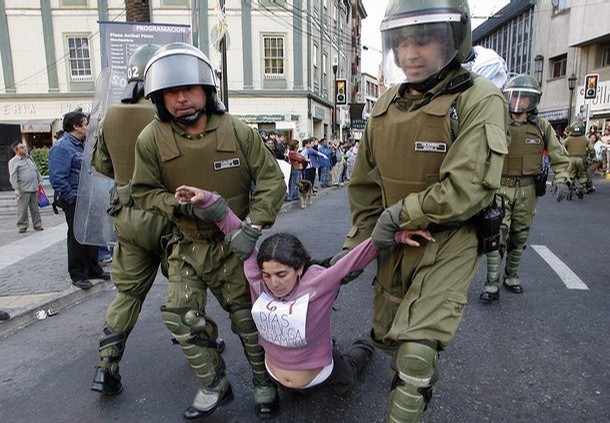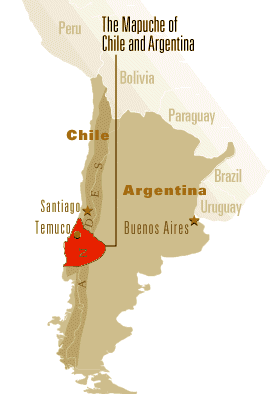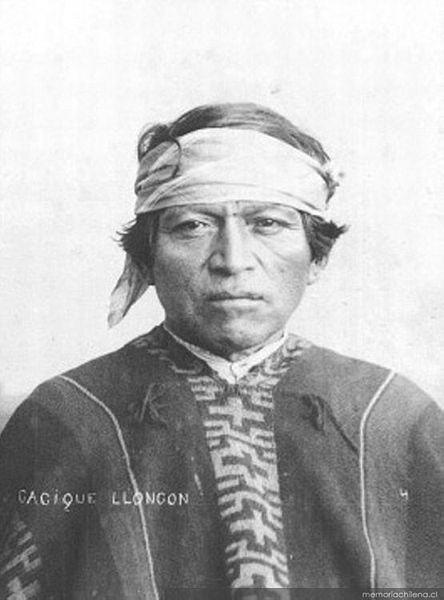The Uprising of Chile’s Mapuche Indians
posted on February 7th, 2010 in Chile, Indigenous Rights
Prosperous Chile’s Troubling Indigenous Uprising
Dec. 12, 2009
Time Magazine
Compared to high-profile groups like the Quechua of Peru and the Yanomami of the Amazon rain forest, Chile’s Mapuche are a relatively obscure indigenous cohort in South America. But that has changed dramatically in recent months as a growing number of armed and masked Mapuche activists, pursuing a centuries-old claim to land they say was taken from them by the Spaniards and then the Chilean government, have engaged in a wave of arson attacks… Their assaults — torching forests, hijacking forestry trucks, seizing rural ranches — have created Chile’s worst security crisis in decades.
But the uprising, which has left four Mapuche dead and more than 100 arrested or convicted, has also spawned a political quandary for President Michelle Bachelet. She has resorted to a controversial antiterrorist law — developed during the brutal, 1973-1990 dictatorship of General Augusto Pinochet — to prosecute Mapuche militants. The measure, used by Pinochet to hound political opponents, allows fewer pretrial rights for defendants, who can be accused by anonymous and masked witnesses. It also imposes longer prison sentences and augments the powers of the police and judicial system — never a comfortable prospect in a country that is still shaking the ironfisted ghosts of the Pinochet regime. “This law is an abomination,” says Richard Caifal, a Chilean human-rights lawyer, “and the government is using it in a discriminating way, only against Mapuches.”
Bachelet had promised before taking office in 2006 that she would not use the law in Mapuche cases. She and her government, however, insist they have no choice at this point. “We’ve decided to invoke the antiterror law to go after these groups of people who are set on perpetrating crimes, disorder and unrest in a region seeking peace and harmony,” Chile’s Deputy Interior Secretary, Patricio Rosend, said recently.
The area he’s referring to is the central Araucania region, where Chile’s 700,000 Mapuches (4% of the country’s 17 million people) were forced to settle after the military finally “pacified” them in 1881. Until then, the Mapuche had resisted efforts by the Inca empire, Spanish colonizers and the new Chilean republic to subjugate them. Many Mapuche leaders still argue the country should return their ancestral lands in regions like south central Chile; but they’re also angry about vast tracts they say were illegally taken from them in Araucania, near the city of Temuco, for forestry operations. This year militants have set fire to tree farms, leaving huge swaths of eucalyptus and pine trees scorched — and prompting local ranchers to stock up on weapons and ammunition.
Government efforts to control Mapuche protests have backfired. Recent raids by special forces of the carabineros, the national police, have scored arrests of Mapuche leaders but also provoked charges of brutality after the shooting of children, journalists and other bystanders. Three Mapuches youths have been killed, and Caifal claims two others were shot in the eyes. What’s more, whereas left-wing terrorist groups garnered little public sympathy during Pinochet’s rule, opinion polls in Chile today show widespread support for Mapuche efforts to regain land.
Bachelet, a member of Chile’s Socialist Party, and her center-left coalition, the Concertación, have been criticized for being soft on criminals. Many political analysts suggest that with presidential elections set for Dec. 13 — and with the Concertación well behind the conservatives in voter polls — the left may hope that employing the antiterror law will bolster its law-and-order bona fides. Sebastian Piñera, the billionaire businessman who leads the polls, has made security and crime-fighting a centerpiece of his campaign.
The government has installed security cameras on major highways, where more and more smoldering frames of forestry trucks are being found after Mapuche hijackings. Tourists have also been warned during this southern hemisphere summer, when the forestry attacks have been escalating, not to use major roads at night. At the same time, Mapuche leaders have made it clear that the latest surge of attacks is part of a strategic push to undermine Chile’s bicentennial celebration next year.
Meanwhile, dozens of Mapuche communities have joined forces to create the Mapuche Territorial Alliance, which among other demands calls for the group’s political independence from the Chilean state. Whether or not that’s a viable proposition, the coalition may well prod the government to a more serious dialogue over the land issues. “Otherwise,” says Caifal, “we are creating a [Mapuche] generation that has grown up in a climate of violence, and that offers a bad future for the country.” Especially if it means raising ghosts from the past.



